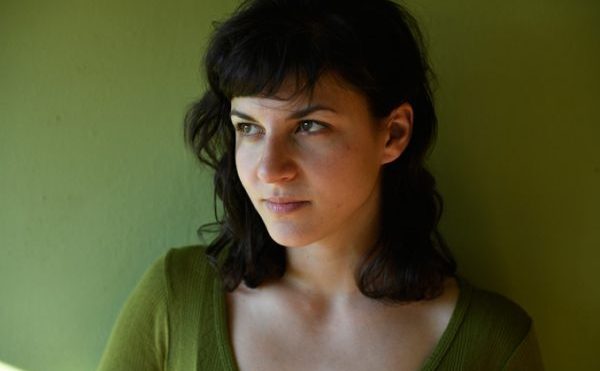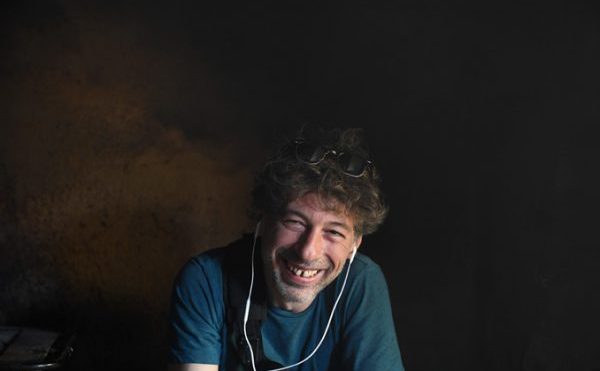
The documentary Honeyland premiered at the 2019 Sundance Film Festival, where it was the most awarded film, winning the Grand Jury Prize, Special Jury Award for Impact for Change, and the Special Jury Award for Cinematography in the World Cinema Documentary competition. Since then, directors Ljubomir Stefanov and Tamara Kotevska have taken the film around the world, from Europe to India to Siberia to the South Pacific. They’ve also flown their lead subject, Macedonian beekeeper Hatidze Muratova, to screenings, including one in New York City where she sang to a delighted audience. Originally commissioned by an environmental group, the film evolved into something entirely different when the directors discovered Muratova, who lived in a rural village that had been essentially abandoned by the government, lacking electricity or running water. They followed Muratova for three years, working two or three days at a time until their camera batteries ran out.
Honeyland is now nominated for two Academy Awards, Best Documentary Feature and Best International Feature (formerly Best Foreign Language Film). Documentaries have been nominated for Best International Feature only a handful of times before, and this is the first time ever that one film has been nominated for both these awards. We spoke with Stefanov, Kotevska, and Fejmi Daut, one of the film’s two cinematographers, the day after Honeyland was awarded Best Nonfiction Feature at the New York Film Critics Circle ceremony. This interview has been edited and condensed.
***
Hyperallergic: Your documentary premiered at Sundance last January. What has the year been like for you?
Tamara Kotevska: How can you plan for this? It’s like we’re in the army.
Ljubomir Stefanov: Our main income this year is from festival awards. We share this money equally. We chose festivals because, for example, we wanted to see India. Sometimes we could combine flights, so we could go from a festival in St. Petersburg to one in Irkutsk.
TK: The festival in New Caledonia, that’s the time we were both crying.
LS: It was in a village north of the island’s main city. The screenings were in a sort of communal space where they all cook and eat together.
TK: The festival organizer, who was half-French and half-indigenous, was telling us how there are 28 local languages for every tribe, and in none of them is there the word “I.” Doesn’t exist. They always speak with “us” or “we.” We heard that and turned to each other and were both crying. I think this is how they understood our film so well, because it’s about sharing and equal responsibilities.
LS: Traveling the world was one thing. It’s different in America. Since July, we’ve been here six or seven times, and it’s exhausting because you’re going from one screening to another all the time. We had a screening in Woodstock for one person.
TK: They took us in the morning in a big black limo, made that one voter happy.
H: Do people often ask why you didn’t help Hatidze?
LS: Yes, a lot of questions like that. Our answer is: You need to make a decision. Are you going to be a humanitarian organization or a filmmaker? We decided to be filmmakers, but also help them later. We changed Hatidze’s life.

H: Did she feel betrayed when Hussein and his family moved into the village? She tried to help them and they took advantage of her, in fact threatened her livelihood.
TK: Just now they are settling their conflict. They finally signed a contract that they will not hurt each other anymore.
LS: It was a contract of mutual respect. We helped them prepare it.
TK: If Hatidze and her neighboring family let you into their way of life, that means both are okay with the way they live. They don’t feel bad about their lives. What’s fascinating is that you can’t even explain to Hussein that what he’s doing might be wrong. He will just laugh at you.
LS: The way the other family accepts life is very different from how people think here. You may have heard that on the day of our premiere at Sundance, the mother gave birth to her eighth child. Now there are rumors that she’s pregnant again. But they’re not bad guys, it’s just their way of life. The audience is perceiving them as bad guys.
TK: In the US, standards for human behavior are different. For other nationalities, what happened to Hatidze might be easier to understand, because they’ve seen similar behavior all around them.
LS: We’re from the Balkans, and in my opinion, your sense of community is even stronger than ours.
TK: In the Balkans, everything is just ‘Do it for me.’

H: What’s it like facing so many question-and-answer sessions?
TK: It’s great, because you can see the mindsets of different kinds of people. But when journalists ask questions, it’s like they want to make you look different from who you are. So we might seem like arrogant people to them.
LS: Because we don’t want to talk. We don’t give interviews. Especially in our country.
Fejmi Daut: The stupidest questions we got were in our own country. We had a screening in our film school, and the students couldn’t come up with one question. The dean was trying to get them to ask something.
TK: My two favorite questions from Macedonia, one was from a film student. He said, ‘Okay, I understand why other people, other festivals in the world, like this film. But I just don’t understand. There are so many movies about bees. Why didn’t you, for example, do a film about ants?’
And there was a very, very, very old lady at another screening, sitting in the back. She had a battle with an old guy in the front, they were testing each other. She got up first and said, ‘It’s so good that you found Hatidze. But did you ever think about making a film about the last traditional Kosovo flute player?’
LS: Because we won three awards at Sundance, we had to keep giving speeches. In one of them, our editor made a political point about the weather, about pollution and climate change. And so back in Macedonia, the first journalist says, ‘You are sending a message about air pollution.’
TK: That’s why they think we’re arrogant.
H: They must have wanted to know about how you shot it.
FD: It was very difficult for us. In Hatizde’s house it was very tight, maybe from this table to the wall [about eight feet]. We didn’t have much space for the camera, no electricity, so everything was natural light. We thought about using artificial light, but it would destroy the ambiance. That’s why we used candles.
H: Did it seem like you were competing against the same people and films at festivals last year?
TK: More or less. I wouldn’t say competing, because the documentary community is very supportive. Everyone we met, they are very down to earth people, very devoted and very supportive. Because they know what we’ve been through. We learned a lot.
LS: For example, how to position yourself in terms of distribution.

H: Do you feel comfortable with that aspect of the industry?
TK: It’s too early to say. We’ll know with our next films whether we’re being exploited.
LS: Things are definitely different now. I’m preparing a long-term project. The wider context of the work is still unknown to me, there are many possible approaches I can take. I’m also working on an animated feature. Tamara is working on a fiction feature.
FD: This year I’ll be working in Nigeria with one of the directors of One Child Nation.
TK: Still, I don’t enjoy this life of festivals and screenings. We enjoy doing things for ourselves, preparing our own meals. When we got to go home for a month, it was the best time of the year.
LS: So things are more in our hands. Now it’s about finding the time.